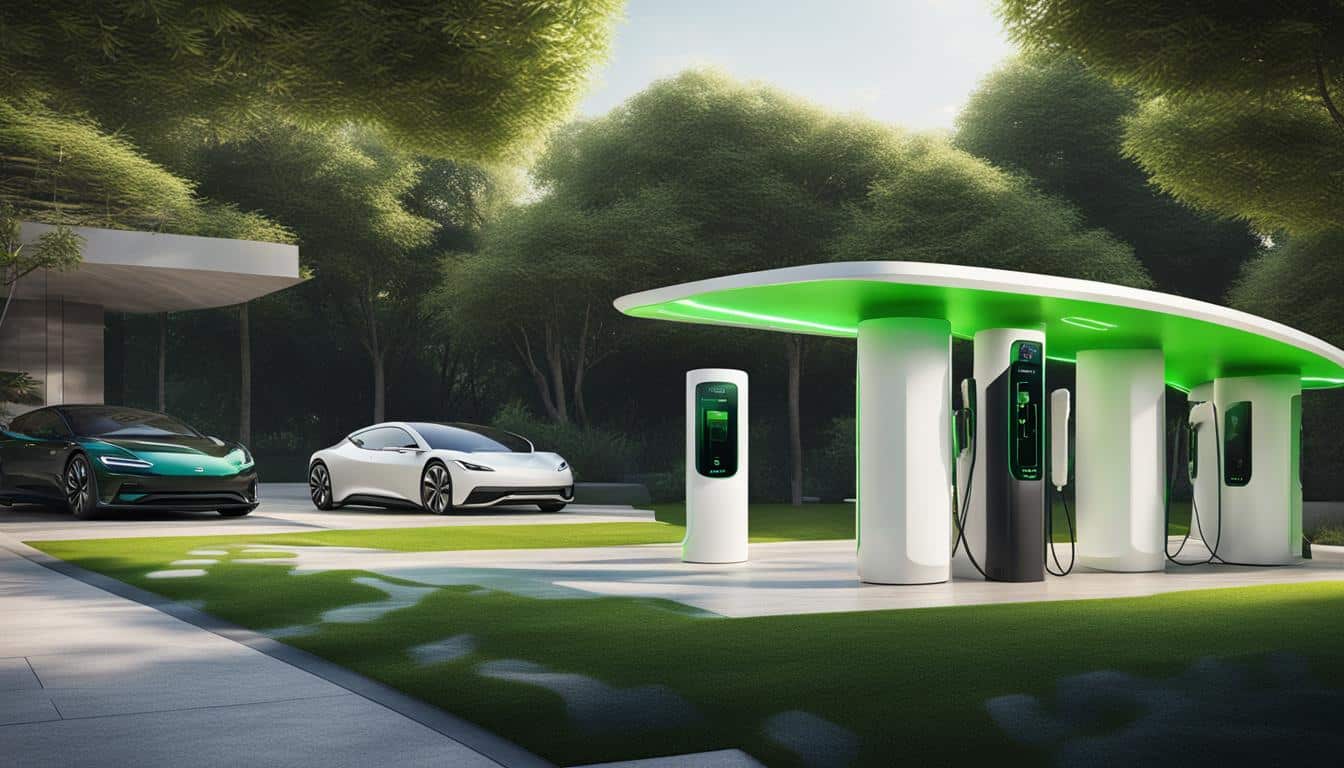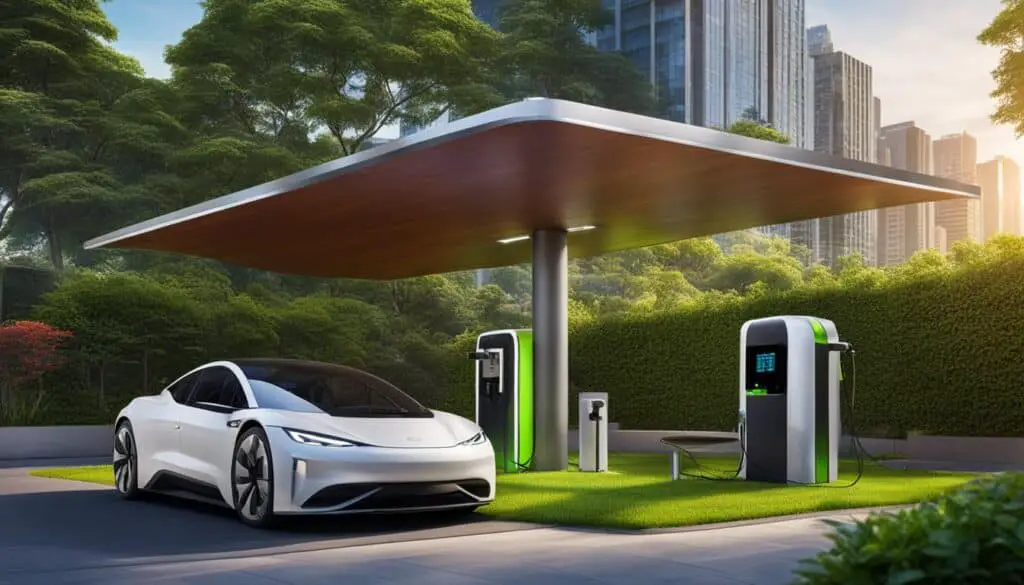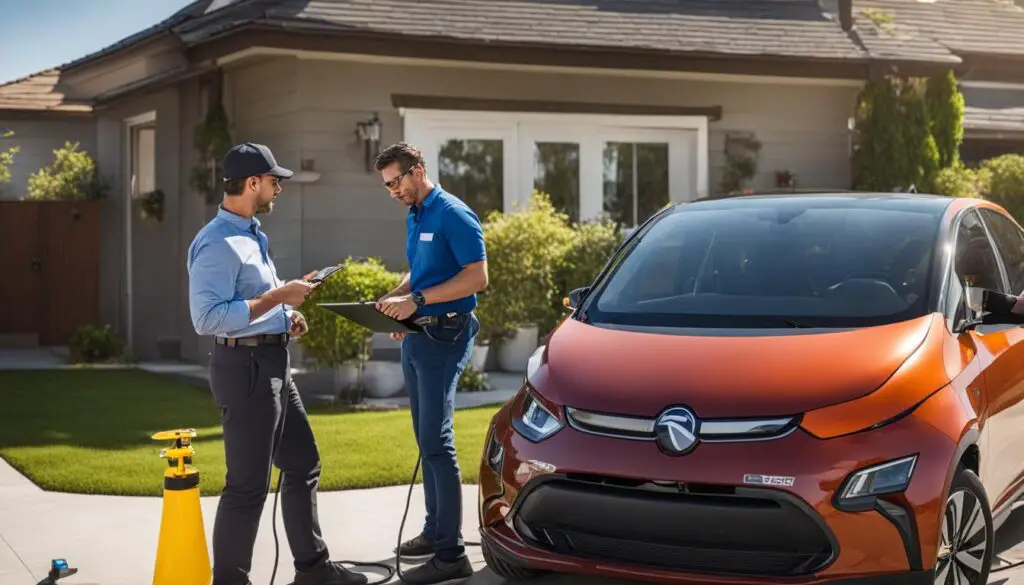
The Ultimate Buyer’s Guide to Electric Car Home Charging Stations
Installing a home charging station is a crucial step for electric vehicle owners. Not only does it offer the convenience of faster charging times, but it also ensures that you have a reliable and efficient power source for your electric car. In this comprehensive buyer’s guide, I will walk you through everything you need to know about the best home charging stations for electric cars, providing you with the knowledge to make an informed decision.
Key Takeaways:
- Home charging stations are faster and more convenient than using a standard household outlet.
- Consider the type and power of charging station that suits your needs.
- Home EV charging stations generally cost less than $1,000, with incentives available to reduce costs.
- Installing a home charging station offers benefits such as faster charging times and protection for your EV’s battery.
- Factors to consider when choosing a charging station include plug compatibility, charging speed, and available features.
Why Install a Home Charging Station?
Installing a home charging station offers numerous benefits and advantages over relying on a standard outlet for charging your electric vehicle (EV).
- Faster Charging Times: One of the key advantages of installing a home charging station is its ability to significantly reduce the time it takes to charge your EV. A Level 2 charging station can charge an EV’s battery in a fraction of the time it takes with a Level 1 outlet. This means you can spend less time waiting for your vehicle to charge and more time enjoying the convenience of electric driving.
- Convenience: Having a home charging station eliminates the need to visit public charging stations or rely on slow-charging options. With a Level 2 charger installed at home, you can conveniently charge your EV overnight or whenever it’s most convenient for you. This ensures that your vehicle is always ready to go when you need it, without the hassle of searching for a charging station or waiting in line to charge.
- Battery Protection: Using a home charging station also helps protect your EV’s battery from long-term damage caused by frequent DC fast charging. Fast charging at public stations, while convenient, can put additional strain on the battery and reduce its overall lifespan. By relying on a Level 2 charger at home, you can charge your EV at a slower, more controlled rate, which is better for the long-term health of your battery.
- Cost-Effectiveness: Home charging is generally more cost-effective compared to using public DC fast chargers. Charging your EV at home allows you to take advantage of lower electricity rates and potentially save on fuel costs. Additionally, many utility companies offer special rates or incentives for EV owners who install home charging stations, further reducing the cost of charging your vehicle.
By installing a Level 2 home charging station, you can enjoy the benefits of faster charging times, convenience, battery protection, and cost savings. It’s an investment that enhances your overall electric vehicle ownership experience.
What Sets Charging Stations Apart: The Basics
When it comes to buying a charging station for your electric vehicle (EV), there are several key factors to consider. These factors will help you make an informed decision and ensure that the charging station meets your specific needs.
- Plug Compatibility: One of the first things to consider is plug compatibility. Most EVs accept J1772 cords, but it’s important to note that Teslas require a proprietary plug. When shopping for a charging station, make sure it is compatible with your EV’s plug type.
- Charging Station Features: Different charging stations come with various features that can enhance your charging experience. Some stations offer smart charging capabilities, allowing you to monitor and control the charging process through a mobile app. Others may have additional safety features or energy management options. Consider which features are important to you before making a purchase.
- Charging Speed: The charging speed of a station is measured in amps (A). Higher amperage chargers generally provide faster charging times. However, it’s important to note that higher amperage stations may come at a higher price. Consider your charging needs and budget when deciding on the appropriate charging speed for your home charger.
- Choices for Home Chargers: There are two main types of home chargers: hardwired and plug-in stations. Hardwired stations require professional installation and are permanent fixtures in your home. Plug-in stations are more flexible and can be easily moved if needed. Consider your preferences and the layout of your home before choosing between a hardwired or plug-in station.
With the right charging station, you can enjoy convenient and efficient charging for your electric vehicle. Consider plug compatibility, charging station features, charging speed, and the type of charger when making your decision.
Now let’s take a closer look at how these factors can impact your charging experience with a charging station:
| Factors | Impact |
|---|---|
| Plug Compatibility | Ensures a proper connection between the charging station and your EV, preventing any compatibility issues. |
| Charging Station Features | Enhances your charging experience with additional functionalities, such as smart charging capabilities or energy management options. |
| Charging Speed | Determines how quickly your EV’s battery will charge. Higher amperage stations provide faster charging times. |
| Choices for Home Chargers | Gives you the flexibility to choose between a hardwired station for a permanent installation or a plug-in station for portability. |
Charging Station Options
When it comes to choosing a home charging station, there are several options to consider. Different brands offer a variety of features and options that cater to individual preferences and needs. Let’s explore some key factors that can help you make an informed decision.
Mobile App Support and Advanced Features
One of the important considerations is whether the charging station offers mobile app support. Many leading brands provide dedicated smartphone apps that allow you to monitor and control your charging sessions remotely. These apps typically provide real-time status updates, charging history, and even notifications when your vehicle is fully charged. This level of convenience and control makes using an electric car even more effortless.

Charger Cable Length and Cable Management
Another crucial aspect to consider is the length of the charger cable. The right cable length depends on the layout of your garage or parking space and the location of your vehicle’s charging port. Most home EV charger cords range from 18 to 24 feet in length, providing ample flexibility for various parking configurations.
In addition to cable length, cable management is also an important consideration. Some charging stations come with built-in cable management systems that keep the charging cable tidy and organized when not in use. This helps to avoid tripping hazards and keeps your charging station area neat and clutter-free.
A Variety of Home Charging Station Brands
When it comes to choosing a brand, you’ll find a wide range of options available. Enphase ClipperCreek, Grizzl-E United Chargers, Enel X JuiceBox, Lectron, Autel, and Tesla are just a few of the well-known brands offering home charging stations. Each brand has its own unique features, power options, and design aesthetics to suit different preferences and budgets.
| Brand | Features | Power Options |
|---|---|---|
| Enphase ClipperCreek | Mobile app support, cable management | Various power options available |
| Grizzl-E United Chargers | Advanced safety features, durable construction | Multiple power options from 16 to 50 amps |
| Enel X JuiceBox | Smartphone app integration, energy monitoring | Power options from 32 to 48 amps |
| Lectron | Compact design, easy installation | Options range from 16 to 40 amps |
| Autel | Advanced safety features, user-friendly interface | Multiple power options available |
| Tesla | Seamless integration with Tesla vehicles | Power options specific to Tesla vehicles |
Choosing the right brand involves considering factors such as the features you require, the power options available, and the overall brand reputation.
As you weigh your options, keep in mind that it’s important to choose a charging station that suits both your current and future needs. By considering factors like mobile app support, charger cable length, cable management, and brand features, you’ll be well on your way to selecting the perfect home charging station for your electric vehicle.
Your First Step: Talking to an Electrician
Before proceeding with the installation of a home charging station, it is crucial to consult a licensed electrician. They possess the expertise to assess your home’s electrical system capacity, ensuring it can support the Level 2 charger efficiently. Moreover, an electrician can evaluate the best location for installing the Electric Vehicle Supply Equipment (EVSE) to optimize convenience and safety.
An electrician’s guidance is invaluable as they can educate you on the technical aspects of the charging station, empowering you to make an informed decision. They will explain how the charging station integrates with your home’s electrical system and provide expert recommendations on the compliant installation process.
“Consulting an electrician ensures the seamless integration of your home charging station with your electrical system. Their knowledge and technical expertise guarantee a safe and efficient charging experience for your electric vehicle.”
It is important to remember that in certain cases, a home charging station may not be necessary based on your vehicle’s charging needs. An electrician can help you make this determination by assessing your specific requirements. By seeking professional guidance, you can avoid potential pitfalls and ensure that your home charging station installation is a success.

| Consulting an Electrician for Home Charging Station Installation |
|---|
| A licensed electrician verifies the electrical system capacity. |
| An electrician finds the best location to install the EVSE. |
| They provide guidance on technical aspects of the charging station. |
| Assessment to determine if a home charging station is necessary for your vehicle’s needs. |
Top Home Charging Station Brands
When it comes to home charging stations for electric cars, there are several popular brands that offer reliable and efficient charging solutions. These brands understand the needs of electric vehicle owners and have developed a range of products to meet those needs. Some of the top home charging station brands include:
- Enphase ClipperCreek
- Grizzl-E United Chargers
- Enel X JuiceBox
- Lectron
- Autel
- Tesla
Each of these brands offers a variety of charging products with different power options, cord lengths, and features. Whether you need a high-powered charger for faster charging or a compact charger for easy portability, these brands have you covered.
You can purchase charging stations from these brands directly from their websites or from major retailers such as Amazon, Best Buy, and Walmart. They provide a convenient and reliable way to charge your electric vehicle at home.
When exploring the options offered by these brands, it is recommended to read buying guides specific to each brand. These guides provide more detailed information about the features, installation requirements, and compatibility of the charging stations. This will ensure that you make an informed decision and choose the best home charging station that meets your specific needs and budget.
Note: The image above showcases some of the popular home charging station brands mentioned in this section.
Conclusion
Installing a home charging station is a crucial step in owning an electric vehicle. With the convenience and faster charging times offered by Level 2 charging stations, you can enjoy a seamless charging experience compared to relying on standard outlets. However, when choosing a charging station, it’s important to consider a few key factors.
First and foremost, make sure the charging station is compatible with your vehicle’s plug. Most EVs accept J1772 cords, while Teslas require a proprietary plug. Additionally, consider the charging speed measured in amps, as this will impact how quickly your vehicle charges. It’s also essential to determine whether you prefer a hardwired or plug-in station, taking into account any requirements from your utility company.
Before proceeding with the installation, consulting a licensed electrician is crucial. They will ensure your home’s electrical system can support the Level 2 charger and help you find the best installation location. They can also educate you on the technical aspects of the charging station, ensuring a safe and efficient setup.
When it comes to choosing a home charging station, popular brands like Enphase ClipperCreek, Grizzl-E United Chargers, Enel X JuiceBox, Lectron, Autel, and Tesla offer a range of options to suit your needs and budget. Reading brand-specific buying guides can provide more detailed information to help you make an informed decision.
FAQ
Why should I install a home charging station?
Installing a home charging station offers faster charging times and convenience compared to relying on a standard outlet. It also protects your electric vehicle’s battery from long-term damage caused by DC fast charging. Home charging is more cost-effective than using public DC fast chargers.
What factors should I consider when buying a charging station?
When choosing a charging station, consider factors such as plug compatibility with your EV, whether you want a hardwired or plug-in station, and the charging speed, measured in amps. It’s important to ensure compatibility with your specific EV and to check if your utility requires hardwiring for incentives.
What are the options for home charging stations?
There are various options and features available for home charging stations. You can choose between models with mobile app support or basic charging stations. Consider the length of the charger cable based on the layout of your garage and the location of your vehicle’s charging port. Also, look at how the charging cable is managed and stored on the station.
Should I consult an electrician before buying a home charging station?
Yes, it is important to consult a licensed electrician before buying a home charging station. They can assess your home’s electrical system to ensure it can support the Level 2 charger and determine the best installation location. They can also educate you on the technical aspects of the charging station and provide guidance on installation costs.
What are some popular home charging station brands?
Some popular home charging station brands include Enphase ClipperCreek, Grizzl-E United Chargers, Enel X JuiceBox, Lectron, Autel, and Tesla. Each brand offers a variety of charging products with different power options, cord lengths, and features. You can purchase these chargers directly from the respective brands’ websites or major retailers such as Amazon, Best Buy, and Walmart.
